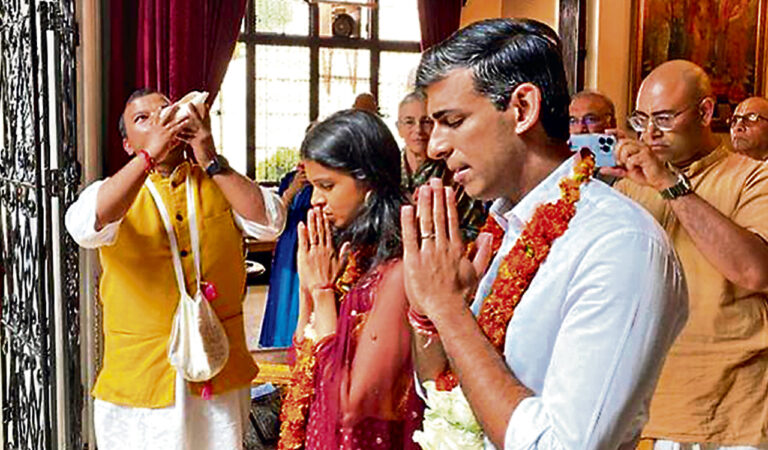Posted: Post Date – 12:37 AM, Monday – Oct 31 22

When Conservative MPs elected Sunak, they didn’t look at his religion or race, they looked at his merits
Arun Sinha
Rishi Sunak’s promotion to British Prime Minister is seen in India as a historic achievement for men of Indian descent abroad. There is nothing wrong with a nation being proud if an immigrant of ancestry ascends high in the foreign sky.
However, we need to be moderate in tomtomming wins. In our country today, emotions are frantically hitting reason, driving it out of the national psyche. It was doing the same thing in the Rishi Sunak case. In this case, we need to rescue reason from the attack of emotion.
Emotional businessman
As Indians, we think of Sunak as an Indian of blood, but emotional merchants have branded him a “proud Hindu”. They dug up pictures of him praying in a Hindu temple, sitting reverently on the floor in front of Swami, worshipping a cow, and posting them on social media. They are reminding us that he was sworn in as a Bhagavad-gita.
Their game is obvious. They wanted him as a jewel in the Hindu crown. They hoped to present him as a great witness to the “genius of Hinduism”, as a link in the infinite chain of “ancient Hindu glory”. For the past few years, they’ve polluted the country’s environment with the toxic fumes of their frenzied, convulsive and disastrous version of Hinduism whose only target is Muslims. Their Hinduism is more anti-Islamic than Hinduism.
In fact, they are dismissive of any Semitic religion in India – Islam, Christianity or Judaism. They want their followers to be “Hindu-compliant” to prove they are “Indian”. They presented them with a Catch-22 proposal: “You are free to worship your God, but you must follow Hindu culture.” Now, a community’s culture is no different than its religion. Asking non-Hindus to follow Hindu culture is tantamount to asking them to follow Hindu religious culture.
Unlike them, Sunak is a diverse person even though he is a proud Hindu. He took the oath to the Bhagavad-gita, but did not want other MPs to do the same. If Emotional Merchants really want to use Sunak as a jewel to adorn their crowns, they will have to be like him – a proud Hindu and a proud pluralist. Otherwise, they are not entitled to bathe in his glory. They cannot selectively choose the Hindu part of his religious worldview and reject the pluralist part. If he is a symbol of Hindu pride, they must accept him as a whole and not cut off parts of him for convenience.
Remember Antonio Costa?
It is doubtful that they would do so. Seven years before Sunak became British Prime Minister, Antonio Costa, a man of Indian descent, took over as Prime Minister of Portugal. Does anyone remember the kind of Costa “Coronation” celebrations in India that we witnessed in Sunak’s “Coronation”? Are pictures of Costa Rica’s communion at church, sitting in front of a bishop or making sheep and cows for a Christmas crib dug up and posted on social media? Did it mention that he took an oath to the Bible?
No, nothing like that happened. The only people who are collectively proud of the Costa’s altitude are Goans in general, and Goan Christians in particular. Emotional businessmen are not eager to claim that ancestors contributed to Costa’s achievements. The reason is obvious. He is a Christian. There is no place for a “proud Christian” in the collective pride of Hinduism. If it wasn’t Costa but Corsambi, the emotional merchant might have bought the entire Sivakasi for applause.
For the British, Sunak is a symbol of multiculturalism, and so is the Costa for the Portuguese. Sunak is an ethnic minority with a different religion than most Britons. In a predominantly white and color-conscious country, he was brown. However, when Conservative MPs elected him leader, they did not consider his religion, race or colour. They looked at his merits; they thought he was the best person for the job.
Costa is also from an ethnic minority, although he follows a religion that is followed by most Portuguese. He is also brown. But his ethnic origin and colour did not prevent him from being selected as prime minister by the centre-left coalition. They chose him because he had earned a reputation as a brilliant socialist statesman.
The opposition in England or Portugal also never attacked Sunak or Costa on the grounds that they were of “foreign blood”. There is no incitement, lawsuit, accusation, innuendo, name-calling, defamation and barbs to prevent them from taking over the Prime Minister’s Office. They may attack their policy and performance issues, but never their origins.
Indian records
Where does India stand compared to England and Portugal in whole-heartedly accepting people of foreign descent into political office? We only have to recall the case of Sonia Gandhi to get a shameful answer.
In May 2004, she led the United Progressive Alliance (UPA) to overthrow the Vajpayee-led National Alliance for Democracy (NDA) government and won a comfortable majority in the Lok Sabha. Members of Congress and allies are ready to elect her as their leader. But the Bharatiya Janata Party launched a name-calling campaign against her. Rumors circulated that she was not an Indian citizen, she still held Italian citizenship, and the constitution did not allow a person of foreign descent to be prime minister.
The truth is that she had obtained Indian citizenship back in 1983, more than two decades before she was accused of failing to do so. As far as the constitution is concerned, it allows any Indian citizen to become prime minister. It does not prohibit persons of foreign descent who have become citizens from holding political office.
However, despite being the prime minister candidate for the majority, despite being an Indian citizen, she was rejected by emotional businessmen. If emotional businessmen believed in diversity as the Brits and Portuguese do, they wouldn’t attack her for her foreign ancestry. They would have her take over as prime minister and attack her policies and performance as the holder of the position.

(The author is an independent journalist and author)
